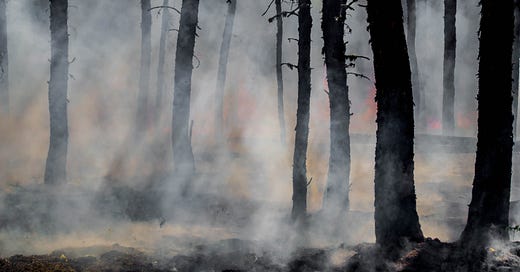Rejections are the worst, but...
Hi writer friends,
Welcome to One More Question. This is a newsletter for freelance writers who want to keep doing the work, even when it’s really hard. I hope you’re hydrated and caffeinated and feeling good.
Today we’re talking about REJECTIONS. Fun stuff.
But first: Have you signed up to be a paid subscriber yet? You’ll have access to weekly pitch calls, hundreds of archived posts, my big list of editor contacts, and lots more.
Rejections are the worst. But?
My eyes are closed, and I try to imagine what it feels like to burn. Not like a sunburn or the blister that rises on your finger when you accidentally touch the stove. I try to imagine a wall of fire all around me, snapping and snarling and closing in.
Dramatic, huh? Those lines are the lede of a story I wrote that was killed. (For those lucky enough to not know this term, a killed story is when an editor decides to not publish something after you turn it in.) It was a story I was proud of, for a publication I was SO excited to write for, and it was one of the very first assignments I received after quitting my full-time editing job last year. Now that story lives in Google Drive, nestled next to client folders and Untitleds with 50-word ideas I had and then abandoned.
I felt like I was going to throw up when the editor told me I hadn’t taken the angle she was expecting, and could I please invoice for the kill fee. (I probably should have been grateful for the kill fee.) But I’d spent so many hours on that piece. There was so much research, and time spent with sources, and bold (I thought) commentary I’d agonized over getting just right. There was heart. I poured my heart into it. And she didn’t even want it?! But!
Thanks for all the work you did on this. But…
She would rather pay me to take it elsewhere.
Rejections can be swift or they can be silent. They can tear into you with honesty or they can creep up on you with insidious uncertainty. Did they even read my email? you might ask after weeks have passed since sending your best pitch ever. Or, will they ever open my emails again after suffering through that feckless story idea? Does “I’ll pass” mean please never contact me again?
Writers receive rejections in so many forms. They come at us in every step of the process. And we often come up with rejections that aren’t rejections at all, like when a story is sent back to us full of suggested edits. I thought it was good. And it probably is good. But still—we feel the burn of rejection. They hated it.
I can’t help but take rejection personally. I can’t help but see it everywhere. So I’m not here to tell you how to avoid that. For most of us, it just comes with the job, I suppose.
But once you’ve shed some tears or taken a walk or written an angry follow-up (and then trashed it—you should almost NEVER send those), it is possible to reframe rejections as opportunities or circumstances that have nothing to do with your skills as a writer.
Here’s the thing. Rejections suck, but…
A killed story is an opportunity to make it better and find it a better home.
A rejection on a pitch is often about the publication. Or timing. Or budget. Not the pitch. Or it is about the pitch and it’s a chance to make it better.
A pitch that never receives a response is about the editor’s overwhelming inbox, not you. Editors don’t have enough time. Don’t waste yours making it personal.
Edits are the editor’s job and are not a rejection at all. They are part of the collaborative process of writing articles—not a judgement of your writing style.
So there. Feel better? It took me months to not cringe whenever I thought about that killed story. But lately, I’ve been thinking about it in a new way. I have new things to say about that topic and I’m still working through how to say them. And yeah, the piece I turned in was absolutely not in line with the angle I had discussed with my editor. But I think the angle I found—the one I am still uncovering and adjusting—might be even better.
It just needs some time. And had that editor published it as it was, it wouldn’t have been the story I know it can be.
Your words don’t disappear into thin air when they’re rejected. They just get to hang out and dance around and get themselves all mixed up with potential and perspective while you move on to other things.
Your pitches don’t disappear either, even if they never lead to an assignment. Those rejected pitches are not wasted time. They are the work that happens before we find work. They are necessary and frustrating and your next pitch will be better for it. They’re part of getting better.
In closing: Rejections suck. They’re financially frustrating and discouraging. But they’re just a step in the process towards writing more and writing better. Make sure to always negotiate a kill fee and they’ll suck a little less.




